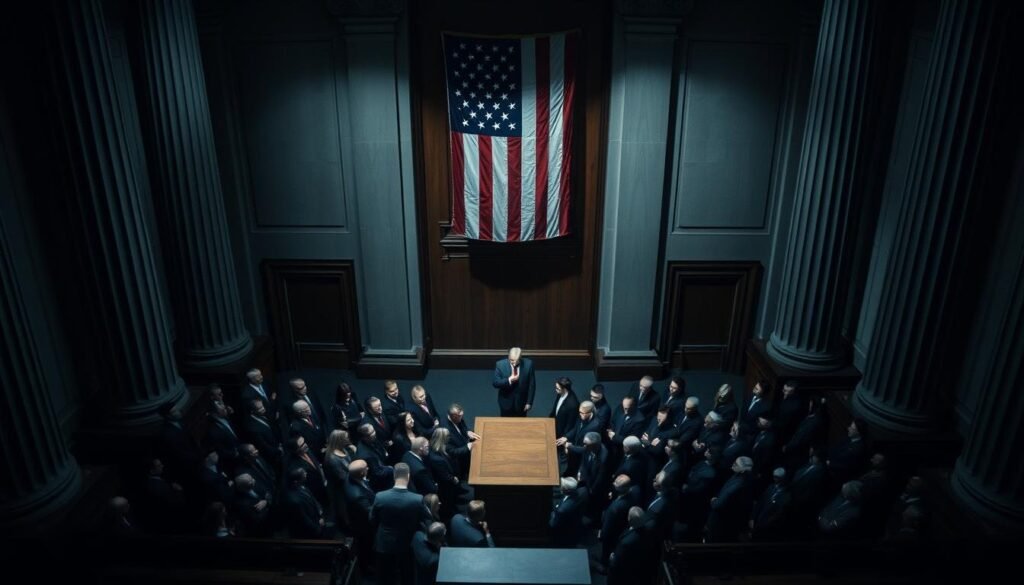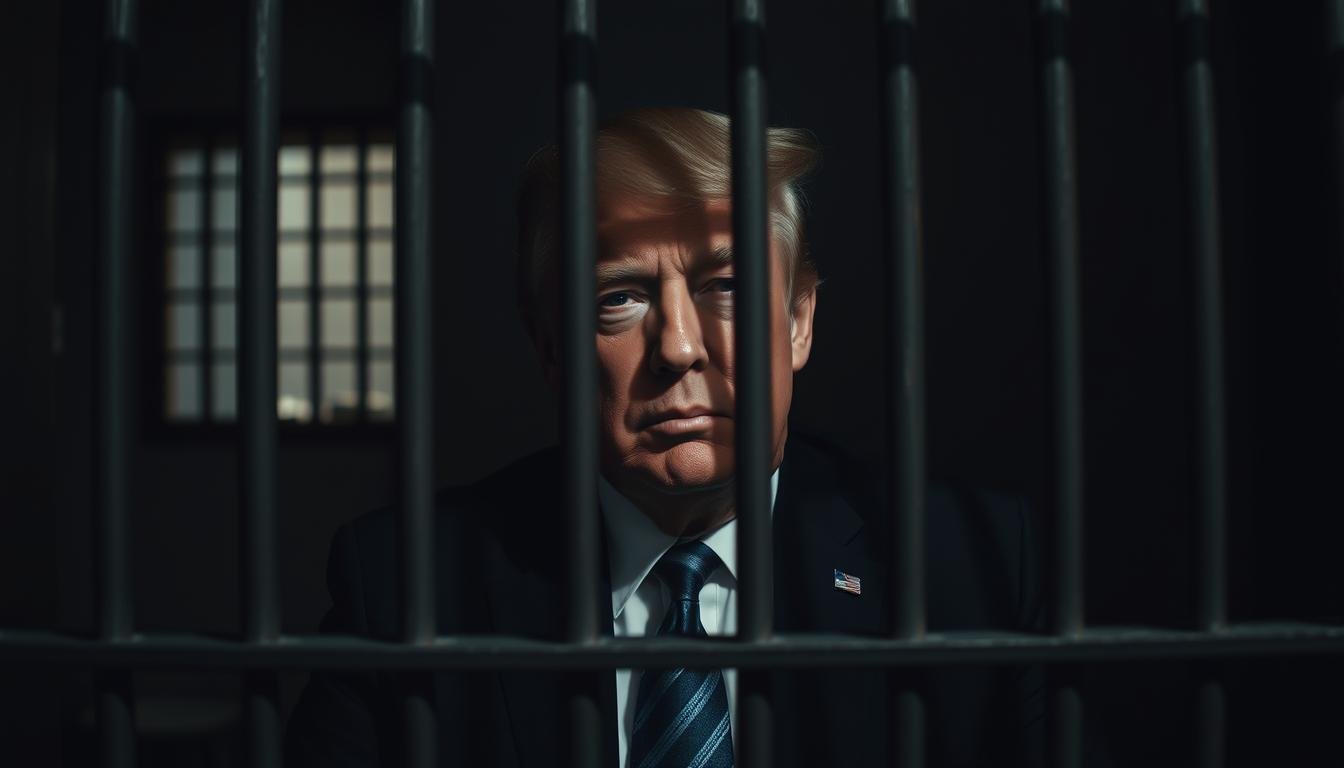Did Any US Presidents Go to Jail? You might be surprised to learn that no US president has ever been imprisoned. But why is that the case?
Exploring the history of presidential imprisonment reveals a surprising truth. Several scandals have nearly led to jail time. Yet, no president has ever faced imprisonment.
The reasons behind this are complex. They involve legal, historical, and political factors. In this article, we’ll look into these factors. We’ll also examine the times when presidents were close to facing jail time.
Contents
- 1 The Short Answer: Presidential Imprisonment History
- 2 Presidential Legal Protections and Immunity
- 3 Presidential Scandals That Nearly Led to Jail Time
- 4 Did Any US Presidents Go to Jail Before or After Office?
- 5 Presidential Impeachments and Their Legal Consequences
- 6 Modern Presidential Legal Challenges and Indictments
- 7 International Comparison: World Leaders Who Went to Prison
- 8 Conclusion: Did Any US Presidents Go to Jail?
- 9 FAQ
- 9.1 Have any US presidents been jailed?
- 9.2 Are US presidents immune from prosecution?
- 9.3 Have any US presidents faced imprisonment before or after office?
- 9.4 What is the impeachment process, and what are its legal consequences?
- 9.5 How do US presidential legal protections compare to those of other world leaders?
- 9.6 Can a president be indicted while in office?
- 9.7 What are the implications of presidential scandals for accountability?
The Short Answer: Presidential Imprisonment History
You might be surprised to learn that no US president has ever been imprisoned. This fact is remarkable, given the many presidential scandals in American history. The reason is the complex legal protections and immunities given to the highest office.
The history of presidential accountability is complex. Various factors have kept presidents out of jail. Even when faced with serious legal challenges, they often avoid jail thanks to their constitutional protections.
To understand the presidential imprisonment history, we must look at law, politics, and the presidency’s unique status. This exploration reveals how presidents have been shielded from imprisonment, even in the face of major controversy.
Presidential Legal Protections and Immunity
Did you know the President of the United States has special legal protections? These are called presidential immunity. They help the President do their job without worrying about lawsuits.
But how much protection does the President really have? They can’t be sued or prosecuted for some actions. Yet, courts have to decide what actions are covered.
The Extent of Presidential Immunity
Presidential immunity isn’t complete. It mainly covers actions done as President, not personal stuff. For example, the President might face lawsuits for personal business or actions before they took office.
These legal protections are important. They make us think about who’s accountable and how power is balanced in the U.S. government. Knowing about these protections helps us understand the President’s role better.
Presidential Scandals That Nearly Led to Jail Time
Some US presidents faced scandals that could have led to jail time. These incidents have sparked controversy and raised questions about their accountability.
The Watergate scandal duringRichard Nixon’spresidency is a prime example. A break-in at the Democratic National Committee headquarters and a cover-up followed. This led to a big investigation, showing widespread corruption. Nixon faced impeachment and possiblepresidential convictions before he resigned in 1974.
Bill Clinton was also involved in a scandal. He was impeached in 1998 for lying under oath and trying to cover up an affair with Monica Lewinsky. Although he was acquitted by a single vote in the Senate in 1999, the scandal damaged his reputation.
Other presidents have dealt with scandals too. For example,Andrew Jacksonwas involved in a duel. AndWarren G. Harding’sadministration was hit by the Teapot Dome scandal. Harding died before the scandal’s full impact was known.
Thesepresidential scandalsshow the importance of checks and balances. They prevent abuse of power. Scandals can lead to severe consequences or little repercussions, depending on the situation.
Learning about these scandals helps us understand their impact. It shows how rarepresidential convictions can be.
Did Any US Presidents Go to Jail Before or After Office?
Many US presidents have faced legal troubles before or after being in office. The presidency is seen as a position of great power. Yet, some presidents have dealt with legal challenges at different times in their lives.
For example, Bill Clinton was involved in a scandal about his draft status during the Vietnam War. He didn’t go to jail, but it had big effects on his life and career.
After leaving office, some presidents have had financial or legal problems. Richard Nixon faced legal issues after he resigned. He was eventually pardoned.
| President | Legal Issue | Outcome |
|---|---|---|
| Bill Clinton | Draft status scandal | No jail time |
| Richard Nixon | Watergate scandal | Pardoned |
| Gerald Ford | Nixon pardon controversy | No jail time |
These examples show that being president doesn’t protect you from all legal troubles. Some presidents have faced big legal issues before or after their time in office.
Presidential Impeachments and Their Legal Consequences
Impeachment is key when we talk about presidential accountability. It’s a complex process with both political and legal sides. [Did Any US Presidents Go to Jail?]
The Constitution lets the House of Representatives impeach the president. They can do this for “Treason, Bribery, or other High Crimes and Misdemeanors.” This rule is important for knowing why impeachment happens. When the House impeaches, it’s like charging the president with a crime.
The Legal Implications of Impeachment
Impeachment has big legal meanings. It’s not the same as being removed from office. It’s more like an indictment. The Senate then tries the president to see if they should be removed. This shows the balance between the legislative and executive branches.
If the Senate votes to convict with a two-thirds majority, the president is out. But, the president can still face court trials for their actions in office. [Did Any US Presidents Go to Jail?]
Knowing about presidential impeachments and their legal effects is key to understanding presidential accountability. Looking at the history and laws of impeachment helps us see how it affects U.S. politics.
Modern Presidential Legal Challenges and Indictments
The presidency is not a shield against legal accountability, as recent events have shown. US presidents have faced various legal challenges, including indictments and lawsuits. These have big implications for presidential accountability and the rule of law.
Modern presidential legal challenges often come from actions taken while in office or during election campaigns. For example, presidents may face lawsuits over their policies or personal conduct. These legal battles can lead to big financial and reputational losses.

- Investigations into campaign finance and election interference
- Lawsuits related to executive actions and policy decisions
- Indictments for personal misconduct or financial impropriety
The table below summarizes key aspects of modern presidential legal challenges:
| Legal Challenge | Description | Potential Consequences |
|---|---|---|
| Campaign Finance Investigations | Probes into campaign funding and potential election interference | Financial penalties, reputational damage |
| Executive Action Lawsuits | Lawsuits challenging presidential policy decisions and executive actions | Policy reversals, judicial oversight |
| Personal Misconduct Indictments | Indictments related to personal misconduct or financial impropriety | Legal penalties, potential impeachment |
The landscape of presidential legal challenges is complex and multifaceted. Understanding these challenges is key to grasping the broader implications for presidential accountability and the rule of law in the United States.
International Comparison: World Leaders Who Went to Prison
Many world leaders have ended up in jail, unlike US presidents. This shows different views on leadership accountability around the world. [Did Any US Presidents Go to Jail?]
For example, former Israeli Prime Minister Ehud Olmert was sent to prison for corruption. Also, former South Korean President Park Geun-hye was impeached and jailed for corruption.
| Leader | Country | Reason for Imprisonment |
|---|---|---|
| Ehud Olmert | Israel | Corruption |
| Park Geun-hye | South Korea | Corruption |
| Nicolas Sarkozy | France | Illegal campaign financing |
This comparison shows how different countries handle leadership accountability. While US presidents have not been jailed, other nations have been stricter on corruption and misconduct.
Conclusion: Did Any US Presidents Go to Jail?
You now understand the importance of presidential accountability in American politics. The question of whether any US presidents have gone to jail is complex. It involves legal protections, scandals, and impeachments.
The actions of leaders shape the legacy of presidential accountability. While no US president has been imprisoned, the threat of legal consequences has influenced their behavior.
Understanding presidential accountability is key in today’s politics. It shows that accountability is vital to keep public trust. [Did Any US Presidents Go to Jail?]
The legacy of presidential accountability will keep evolving. It will be shaped by future leaders and legal frameworks. Expect ongoing debates about presidential power and its abuse.
See Also: Does the Military Salute the Vice President?
FAQ
Have any US presidents been jailed?
No, no US president has ever gone to jail while in office. [Did Any US Presidents Go to Jail?]
Are US presidents immune from prosecution?
US presidents have some legal protections. This includes immunity from some lawsuits. But, how much immunity they have is still debated. [Did Any US Presidents Go to Jail?]
Have any US presidents faced imprisonment before or after office?
While no president has gone to jail while in office, some have faced legal issues. This includes imprisonment or other legal challenges before or after their presidency.
What is the impeachment process, and what are its legal consequences?
Impeachment is a constitutional process. It allows Congress to remove a president from office. The legal consequences can be severe. This includes removal from office and potential disqualification from future office.
How do US presidential legal protections compare to those of other world leaders?
The legal protections for US presidents are not unique. But, the specifics can vary a lot from country to country. Some world leaders have faced imprisonment or other forms of accountability. This shows differences in the rule of law and leadership accountability globally.
Can a president be indicted while in office?
The question of whether a president can be indicted while in office is complex. It has been the subject of significant debate. Some argue that a president is not immune from indictment. Others think the Constitution implies a level of immunity.
What are the implications of presidential scandals for accountability?
Presidential scandals, like Watergate, have big implications for accountability. They show the need for strong checks and balances on executive power. [Did Any US Presidents Go to Jail?]

Hi, I am Tatum Bradford from Washington. I have a background in political science and work as a senior revenue officer. I love learning about U.S. presidents and sharing interesting facts about political history.

